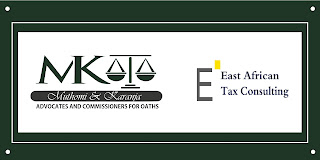2017 is an election year. According to data from the World Bank and the Kenya National Bureau of Statistics, there is a 60% likelihood of a slump in economic growth during an election year in Kenya since 1990 when multiparty politics was introduced.
You can alleviate financial challenges of the election year by utilizing the following tax optimization measures which were availed via the Finance Act, 2016.
1. Be a smart landlord
The government made it easier for small sized landlords to pay tax. If you earn KShs 144,000 per year or less from residential rental property, your rental income is exempt from Income Tax.
 In addition, if your residential rental income falls between KShs 144,000 and KShs 10 million per annum, the gross rental income is taxable at a flat rate of 10%. The tax is final tax.
In addition, if your residential rental income falls between KShs 144,000 and KShs 10 million per annum, the gross rental income is taxable at a flat rate of 10%. The tax is final tax.
Save on compliance costs of record keeping, periodic tax computations and payments by taking advantage of the simplified rental income regime.
2. Employees’ relief
Employees enjoy lower rates of tax from 1 January 2017.
The government expanded the personal income tax brackets by 10% and also increased the personal relief by 10% for the first time in 12 yrs.
In addition, bonuses, overtime and retirement benefits for employees earning KShs 11,180 or less per month before the bonuses, overtime or retirement benefits are exempt from income tax.
3. Invest in the youth
If you employed 10 or more university graduates as apprentices for 6-12 months in 2016, you are entitled to deduct 50% of the salaries and wages paid to the graduate apprentices from your taxable income in 2017.
The incentive is ongoing and you can benefit from the rebate by hiring graduate apprentices in 2017.
4. Developer’s paradise!
Residential real estate developers who construct 400 or more houses in a year will pay corporate tax at a reduced rate of 15%. This is 50% of the ordinary corporate tax rate.
If you are a residential housing developer we advise that you take advantage of this incentive.
5. Reward for play
"All work and no play makes Jack a dull boy" - English Proverb
The government takes play seriously. Companies and individuals who sponsor sports activities are now entitled to deduct the sports sponsorship costs from their taxable income.
6. Gifts of love exempt from tax
“There is nothing more important than a good, safe, secure home” - Rosalynn Carter, former first lady of the USA.Transfers of property between spouses or former spouses as part of divorce or separation settlement, the immediate family or to a company where spouses or a spouse and the immediate family hold 100% shareholding are exempted from Capital Gains Tax.
This provision enhances tax optimal succession planning.
7. Invest in EADB bonds
7. Invest in EADB bonds
Diversify your portfolio by investing in bonds of the East African Development Bank (EADB). Interest therefrom is exempt from income tax. Besides, the bank is engaged in socially impactful financing in East Africa.
8. Say goodbye to the landlord
The mortgage interest relief on owner occupied house has been doubled from KShs 12,500 per month to KShs 25,000 per month. consequently, you can knockoff as much as KShs 100,000 from your tax liability every year by financing your home through a mortgage.
This is a good incentive to say goodbye to your landlord.
This is a good incentive to say goodbye to your landlord.
9. Be charitable
Vehicles for use in aid funded projects are now exempted from VAT. This is good news for donor funded projects.
10. Industries to invest in
10. Industries to invest in
Entertainment and Leisure - Goods imported for construction of recreational parks of 100 acres or more are exempt from VAT. Previously the exemption only applied to recreational parks located in Special Economic Zones.
Agriculture - Raw materials used in the manufacture of animal feeds have been exempted from VAT. Wheat seeds are also exempted from VAT.
 Tourism, Hospitality and Entertainment - Historically these industries suffer the most in an election year. Government has taken measures to ensure that the sector survives the hard times. Museum equipment, park entry fees, tour services, service charge and film equipment are exempted from VAT.
Tourism, Hospitality and Entertainment - Historically these industries suffer the most in an election year. Government has taken measures to ensure that the sector survives the hard times. Museum equipment, park entry fees, tour services, service charge and film equipment are exempted from VAT.
Clean energy - Liquid Petroleum Gas is Zero-rated. Non-electric cooking stoves as well as raw materials to make cooking stoves are exempt from VAT.
Manufacturing - Industrialization is on the radar of GOK. Supplies to enterprises operating in Special Economic Zones (SEZ) are zero-rated. Further, SEZs are allowed to sell garments and leather footwear to the local market free from VAT.
Vehicle assembly - Locally assembled motorcycles and school buses are exempt from Excise Duty.
11. Ask for forgiveness
Taxpayers can now apply for waiver of interest on late payment of taxes in additional to waiver of penalties.
Kenya Revenue Authority (KRA) is now required to pay interest on overpaid taxes not refunded to the taxpayer within 2 years at 1% per month.
The above measures will help you as a taxpayer to manage your cashflow in 2017.
Contact us for assistance:-
East African Tax Consulting
Tel. +254 722 332729
Email.: advisor@taxeac.com
Email.: advisor@taxeac.com




